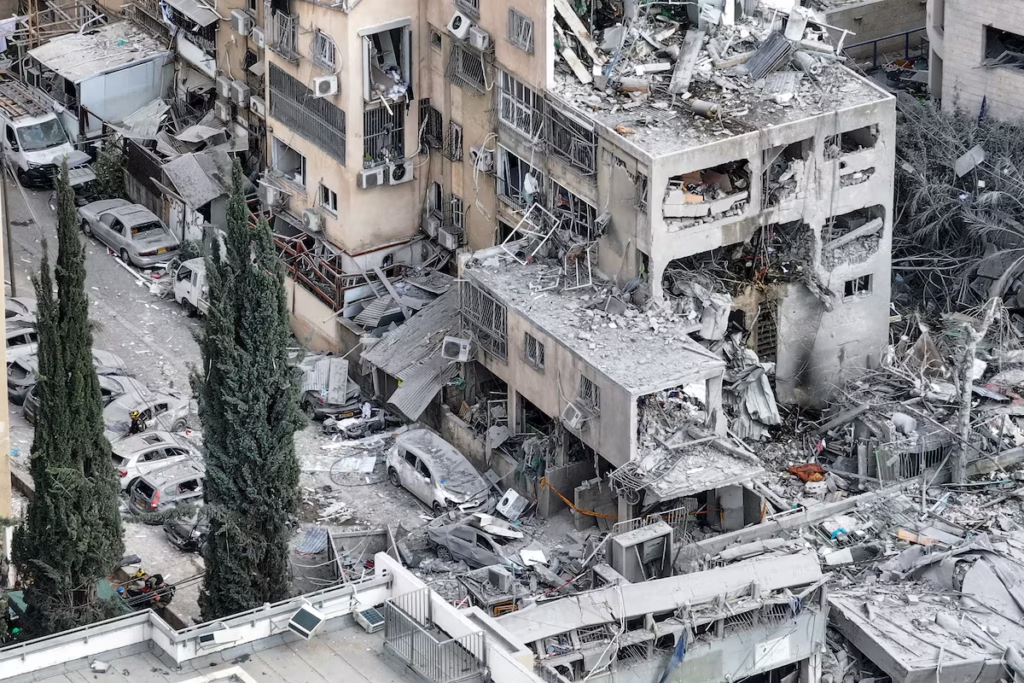Israel’s military has signaled that its campaign will intensify further in coming days. Defence Minister Katz emphasized that while Iran’s leadership would bear the brunt of retaliation, Israeli forces would avoid deliberately targeting Tehran’s civilian population
By Afolabi Ayodele

News Report:
In a dramatic escalation of hostilities, Iranian missiles rained down on Israel’s coastal cities of Tel Aviv and Haifa in the early hours of Monday, killing at least eight people, injuring scores, and causing widespread destruction to residential areas. The strikes, which mark Tehran’s boldest direct assault on Israeli territory in decades, have drawn a fierce warning from Israel’s Defence Minister, Israel Katz, who vowed that the residents of Tehran “will soon pay the price” for the attacks.
The Iranian parliament, meanwhile, revealed plans to push a bill for the country’s withdrawal from the Nuclear Non-Proliferation Treaty (NPT), a move that could have far-reaching consequences for regional and global security. Despite this, Iran maintains its public stance against developing weapons of mass destruction, stating that the legislative process may take weeks.
While Israel has never officially confirmed its nuclear capabilities, it is widely believed to possess a significant atomic arsenal, remaining the only state in the Middle East outside the NPT framework.
The Israeli military claimed major successes in its counteroffensive, announcing the elimination of four senior Iranian intelligence officials, including the chief of the Revolutionary Guards’ intelligence unit. According to Israel’s Defence Forces (IDF), seven out of roughly 100 Iranian missiles successfully breached Israeli defenses, causing casualties and property damage. The IDF further asserted that its forces have secured aerial dominance over Iran and neutralized over a third of Tehran’s surface-to-surface missile platforms.
Israel reported that over 100 civilians were wounded in the overnight onslaught, part of Iran’s retaliation for prior Israeli strikes aimed at Tehran’s nuclear and ballistic missile infrastructure. On the Iranian side, state media and health officials confirmed at least 224 deaths—most of them civilians—and extensive damage in regions such as Kermanshah, where the Farabi hospital and surrounding areas were heavily hit.
In Haifa, emergency teams worked frantically to rescue survivors trapped under rubble, with reports of fires and damage near a key power plant by the city’s port. In Tel Aviv, videos captured missile trails and explosions lighting up the sky as blasts rocked the Shuk HaCarmel market district and shattered windows in residential buildings near the U.S. Embassy outpost. American officials confirmed minor damage to their diplomatic facility but no casualties among staff.
For many residents like Guydo Tetelbaun, the early morning missile alarms marked a terrifying new chapter in the conflict. “It’s the fear of the unknown that’s worst,” he said after sheltering from the blasts that tore through his Tel Aviv neighborhood.
Iran’s Revolutionary Guards claimed to have employed new tactics that confused Israel’s multi-layered air defense systems, allowing more missiles to strike targets than previous attempts though they withheld specifics.
As the conflict entered its fourth day, the war’s impact reverberated globally. G7 leaders convening in Canada prioritized the Iran-Israel clash on their summit agenda. U.S. President Donald Trump expressed cautious optimism that diplomacy might yet prevail but acknowledged the possibility of extended warfare.
Oil prices, which surged by 7% on Friday amid fears of Middle East disruption, fell slightly on Monday as energy infrastructure in both nations remained largely unaffected. Stock and currency markets across Asia showed little immediate reaction, though geopolitical uncertainty loomed large.
Israel’s military has signaled that its campaign will intensify further in coming days. Defence Minister Katz emphasized that while Iran’s leadership would bear the brunt of retaliation, Israeli forces would avoid deliberately targeting Tehran’s civilian population.
Meanwhile, tensions simmer between Washington and Tehran. Iran accuses the U.S. of complicity in Israel’s operations a charge the White House firmly denies. Trump reiterated that Iran could halt the war by consenting to strict limitations on its nuclear program, which Western governments fear could be used to develop nuclear weapons a claim Iran continues to reject.
As the deadliest direct conflict between these two regional adversaries in years unfolds, the risk of wider war in the already volatile Middle East continues to grow.
Join us on our WhatsApp Platform @KOIMEDIA NEWS YOUR PAGE
Koikimedia Bringing the World 🌏 Closer to Your Doorstep
